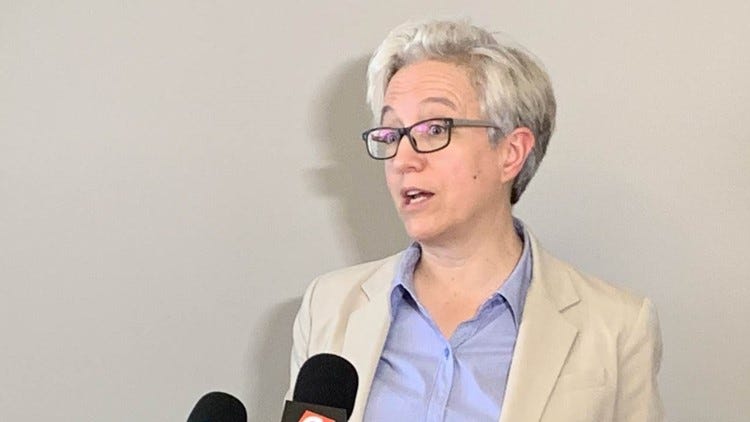Kotek delivered big win for big donor La Mota
Cannabis biz La Mota had a big February thanks to its friends Oregon Governor Tina Kotek and outgoing Secretary of State Shemia Fagan

Oregon state government and politics now hinge, to a remarkable degree, on events that coincided in early to mid-February 2023. In the span of two weeks, Oregon Governor Tina Kotek and Secretary of State Shemia Fagan, each recipients of large campaign donations from tax-dodging cannabis firm La Mota and its owners, took decisive action against La Mota’s public enemy number one: the Oregon Liquor and Cannabis Commission (OLCC).
On February 1, then longtime OLCC Director Steven Marks told his staff Kotek had asked him to resign. That same day, Fagan’s office circulated a much-anticipated - and, as it turns out, La Mota shaped and edited - audit critical of the OLCC’s regulation of cannabis businesses. And, Kotek’s office says, it was the first day she learned of the OLCC’s months-old finding that some of its executives, including Marks, had caused bottles of rare bourbon to be set aside for their and others’ purchase.
In a letter dated February 8, as the bourbongate scandal was breaking into the news, Kotek made sure to clarify that she learned of bourbongate only after asking for Marks’ resignation. That seemingly unnecessary provision of the letter caught my attention at the time. I’ll have more on my evolving thinking on it later in this piece.
On February 9, Fagan called Oregon Ethics Commission staff to obtain a verbal opinion on the permissibility of a consulting gig with cannabis business Veriede Holding LLC, owned by the owned by Rosa Cazares and Aaron Mitchell, who also own La Mota. According to Fagan, Ethics Commission staff told her she should recuse herself from Secretary of State business relating to the cannabis industry if she began working for Veriede.
On February 15, Fagan emailed her Secretary of State office staff to inform them she was recusing herself from the office’s audit of cannabis regulations on account of her contract with Veriede. By February 15, the audit, which recommended significantly relaxing regulations on the industry, was already substantially complete.
February 15 was also Steven Marks’s last day on the job as Director of the OLCC.
When viewed as a whole, the events between February 1 and February 15 represent a tremendous victory for La Mota, Cazares and Mitchell rare in its breadth and scope. The Secretary of State’s audit division, then still seen as a somewhat reliable neutral source of information about Oregon state government, had endorsed Cazares’s central argument: that the OLCC was unfairly and inequitably choking the state’s cannabis businesses. And Kotek had fired Marks, the architect of the OLCC’s cannabis regulations from the time Oregon legalized recreational marijuana. The ground was set for an entirely new approach to cannabis regulations in the mold preferred by Cazares and Mitchell.
Cazares and Mitchell had invested and risked a lot to win that victory. They and businesses and political action committees had donated $45,000 to Fagan’s campaign fund, in addition to hiring her as a consultant for $10,000 per month. They had also given $68,365 to Kotek’s campaign in her hard-fought race for governor. They hosted a reception for Kotek’s campaign in May 2022 in a house the couple rented in Portland (the landlord is now suing the couple for unpaid rent on the residence). As the La Mota/Fagan scandal broke, Kotek said she would donate an amount in excess of her La Mota donation to charity.
The La Mota influence on the Secretary of State’s audit is obvious and in the public record now. The remaining, and larger, question is whether La Mota or other cannabis industry interests were involved in the termination of Steven Marks as the director of OLCC.
Cazares and Mitchell had invested heavily in Kotek, as they had Fagan. Marks, in addition to crafting the cannabis regulations the La Mota team hated, had pushed back on an early draft of the audit, saying it read like a cannabis industry blog post. Marks was a major obstacle, perhaps the major obstacle, to La Mota’s goal of relaxing cannabis regulations.
And now he’s gone. Kotek’s office says that she did not fire Marks “in response to input” from La Mota or Fagan, according to The Oregonian. But she also wrote that she fired him before she learned about bourbongate. And she has declined to elaborate further on why she fired Marks.
Knowing what we know now about La Mota, Cazares and Mitchell, and the two weeks in February that yanked Oregon’s cannabis regulatory environment sharply in their favor, there is another plausible reason Kotek may have seen necessary to clarify on February 8 that she fired Marks before she learned about bourbongate.
Kotek may have wanted Cazares, Mitchell and the rest of the cannabis industry to know she, like Fagan, had done them a very big favor.




Oregon has always been a special place to me. Sadly, I no longer recognize it. What can we do?
What are the changes La Mota has sought to Oregon law? You well describe the timeline of the firings of two compromised people, but what actual revisions to the OLCC laws will be or have been made?